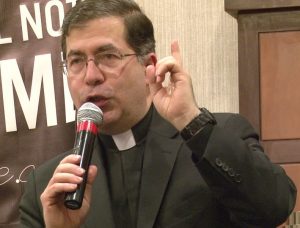‘A Culture of Life’: The Catholic Church Has Never Advocated for the Death Penalty
MARIO ROBERTO DURÁN ORTIZ VIA WIKIMEDIA COMMONS
Pope Francis edited the Catechism in 2018 to reaffirm the Church’s stance that even those who have committed serious crimes are still worthy of dignity as humans.
October 18, 2020
The Catholic Church’s mission is all about a culture of life. It supports life from conception to natural death, no matter the person, their circumstances, their problems or their way of living.
No one deserves to die. That’s always been a central tenet of most moralities and especially of the Judeo-Christian worldview — “You shall not kill” is the fifth commandment for a reason.
Although the Catholic Church had not previously condemned the death penalty on the whole, its prior stance was in no way in support of it.
In his article “Why the Death Penalty Is Immoral and Un-American,” Riley Moore, Fordham College at Lincoln Center ’23, argues for just that: The death penalty historically goes against America’s core values and beliefs, and he cites many early thinkers who argue for why capital punishment is wrong. As a Catholic, I agree with much of what he says. But at the end, he wrote, “Christians walk around with a symbolized machine of death around their neck, foolishly believing it a sign of love and forgiveness.” Catholics believe in the saving redemption of the Crucifixion, but no Christian idealizes the thought of dying, killing or being killed. This “machine of death” is a symbol of love and forgiveness because Jesus offered himself in order that humanity not die forever.
On the death penalty, the Catechism of the Catholic Church paragraph 2267 before 2018 read, “The traditional teaching of the Church does not exclude, presupposing full ascertainment of the identity and responsibility of the offender, recourse to the death penalty, when this is the only practicable way to defend the lives of human beings effectively against the aggressor.”
The death penalty was only acceptable if there was no other option, like if the person being killed is sure to be the criminal and if the person is a risk of harming others. It’s never been the church’s first, or even 10th, solution.
Catholics believe in the saving redemption of the Crucifixion, but no Christian idealizes the thought of dying, killing or being killed.
In 2018, Pope Francis edited this paragraph to read, in part, that “there is an increasing awareness that the dignity of the person is not lost even after the commission of very serious crimes.”
In this modern age, “more effective systems of detention have been developed, which ensure the due protection of citizens but, at the same time, do not definitively deprive the guilty of the possibility of redemption.” The Church teaches that “‘the death penalty is inadmissible because it is an attack on the inviolability and dignity of the person,’ and she works with determination for its abolition worldwide,” as stated in the current paragraph 2267.
This directly supports the Dignity of the Human Person, one of seven Catholic social teachings that’s extremely popular today, in its want for life for everyone. In his most recent encyclical “Fratelli Tutti,” Pope Francis yet again provides proof that even some in the early Church were “clearly opposed to capital punishment.”
The Church has also historically been looking out for people’s souls. It’s the first goal in the Baltimore Catechism: “God made me to know Him, to love Him, and to serve Him in this world, and to be happy with Him forever in the next.” The effective systems of detention, such as life in prison, both ensure the protection of citizens — the Church’s old fear — and also give the criminal the opportunity to repent — the Church’s main goal of the salvation of souls. It kills two birds with one stone, if you pardon the death metaphor.
This isn’t a change to Catholic doctrine. This is an elaboration that fits with the times. We have means of allowing people to live and keeping them safely away from society (medieval jail cells are much easier to get out of than today’s prison cells, I would assume), so the Church’s teaching now reflects that fact.
It’s not anti-Catholic to be anti-death penalty. If the Church supports life from conception to natural death, and if the Church’s goal is the salvation of souls and repentance, then there’s no reason that the death penalty should be a moral issue for Catholics.
The effective systems of detention, such as life in prison, both ensure the protection of citizens — the Church’s old fear — and also give the criminal the opportunity to repent — the Church’s main goal of the salvation of souls.
This is where a lot of conservative Catholics differ from general conservative thought; we believe that life is an inalienable right — to use Thomas Jefferson’s words — no matter what crimes a person has committed. They are always deserving of forgiveness and mercy, no matter what the crime, even if our human minds cannot fathom forgiving them.
Even if we wanted to follow the rules as they were, Catholics don’t follow many rules from the Middle Ages. Just because some arbitrary rule has been around for a long time doesn’t mean it can’t be changed or modernized in some way. For instance: We can eat meat on Fridays during the year. Mass is said in the common language. The church I go to has an LGBTQ+ ministry group. These are just a few things that prove that yes, indeed, the Church can change.
With the advent of modern technology and ways of tracking people, keeping someone in prison for life is just as safe for society as sentencing them to death, and it’s actually cheaper to keep people in prison than to kill them.
I agree with Moore that we shouldn’t bring in Christian dogma to support capital punishment. I, too, don’t support capital punishment because I, as a Catholic, have always supported a culture of life through all stages and for all people. The Catholic Church has never fought to keep the death penalty, nor will it support capital punishment at all today.















Dudley Sharp • Oct 20, 2020 at 3:53 pm
references for the claims in the Oct 19 post: If you need more, let me know.
1) “3. Not all moral issues have the same moral weight as abortion and euthanasia. For example, if a Catholic were to be at odds with the Holy Father on the application of capital punishment or on the decision to wage war, he would not for that reason be considered unworthy to present himself to receive Holy Communion. While the Church exhorts civil authorities to seek peace, not war, and to exercise discretion and mercy in imposing punishment on criminals, it may still be permissible to take up arms to repel an aggressor or to have recourse to capital punishment. There may be a legitimate diversity of opinion even among Catholics about waging war and applying the death penalty, but not however with regard to abortion and euthanasia.”
“Worthiness to Receive Holy Communion: General Principles”, from then Cardinal Ratzinger (now Pope Emeritus Benedict XVI) Prefect of the Congregation of the Faith, the top authority of the body responsible for promulgating and defending Catholic doctrine, in a memorandum to Cardinal McCarrick, made public in the first week of July 2004.
2) A thorough rebuttal to any effort to end the death penalty, based upon Catholic teachings.
By Man Shall His Blood Be Shed: A Catholic Defense of Capital Punishment (2017), Edward Feser & Joseph Bessette
https://prodpinnc.blogspot.com/2017/12/by-man-shall-his-blood-be-shed-catholic.html
Why the Church Cannot Reverse Past Teaching on Capital Punishment, Profs. Edward Feser and Joseph M. Bessette, The Catholic World Report, July 17, 2016, http://www.catholicworldreport.com/Item/4928/why_the_church_cannot_reverse_past_teaching_on_capital_punishment.aspx
Four Catholic Journals Indulge in (anti death penalty) Doctrinal Solipsism, Steven Long, THOMISTICA, March 5, 2015
http://thomistica.net/commentary/2015/3/5/mutationist-views-of-doctrinal-development-and-the-death-penalty
The Death Penalty: Mercy, Expiation, Redemption & Salvation
http://prodpinnc.blogspot.com/2013/06/the-death-penalty-mercy-expiation.html
New Testament Death Penalty Support Overwhelming
http://prodpinnc.blogspot.com/2014/01/new-testament-death-penalty-support.html
3) “Archbishop Chaput clarifies Church’s stance on death penalty”, CNA, Catholic News Agency, Oct 18, 2005. Chaput was then archbishop of Denver, now of Philadelphia
4) Catholic Church: Problems with Her Newest Death Penalty Position: The Catechism & Section 2267
http://prodpinnc.blogspot.com/2015/03/catechism-death-penalty-problems.html
BISHOPS HIDE TRUTH FROM THEIR FLOCK: DEATH PENALTY
http://prodpinnc.blogspot.com/2016/10/bishops-hide-truth-from-their-flock.html
Catechism & State Protection
http://prodpinnc.blogspot.com/2014/10/catechism-state-protection.html
Why the Death Penalty is Still Necessary, Profs. Edward Feser and Joseph M. Bessette, The Catholic World Report, July 21, 2016
http://www.catholicworldreport.com/Item/4939/why_the_death_penalty_is_still_necessary.aspx
5) Rebuttal to all the Church’s secular anti death penalty nonsense
Catholic Bishops: So Wrong on Death Penalty
http://prodpinnc.blogspot.com/2016/09/catholic-bishops-so-wrong-on-death.html
The Death Penalty: Fair and Just
http://prodpinnc.blogspot.com/2013/12/is-death-peanalty-fairjust.html
The Death Penalty: Justice & Saving More Innocents
http://prodpinnc.blogspot.com/2013/05/the-death-penalty-justice-saving-more.html
The Death Penalty: Saving Innocent Lives
http://prodpinnc.blogspot.com/2013/10/the-death-penalty-do-innocents-matter.html
Dudley Sharp • Oct 19, 2020 at 3:38 pm
Very odd article.
Douay-Rheims Bible, Genesis 9:6
“Whosoever shall shed man’s blood, his blood shall be shed: for man was made to the image of God.”
See context and cross references:
https://biblehub.com/catholic/genesis/9-6.htm
You write: “no one deserves to die”. God has stated that we all deserve to die and we do so, because of our sins. Are you unaware?
“”You shall not kill”, as is well known, is more, properly translated as “thoud shalt not murder”, as Catholics have known, forever, as both killing in self defense, in defense of others and in a just war, as well as, until 2018, with executions, have all been deemed ethical under specific circumstances.
There has, never, been a time in Catholic history, where the dignity of sinners or of those subject to the death penalty was not recognized by the Church. Of course that is not new.
The Church has, well known, that man’s criminal justice systems, fail, often at protecting the innocent, so any teaching that ” “more effective systems of detention have been developed, which ensure the due protection of citizens” is, utterly, false, if one knows anything about the world’s criminal justice systems.
And we all know, that no death deprives anyone of redemption, as well all know that redemption is between God and the individual and must be completed, prior to death, no matter when or how that death occurs. All Catholics are aware of that. It is an eternal rule that all humans will die because of our sins. What Catholics would say God has, therefore, denied redemption?
The article tells us that both biblical and Catholic teachings are arbitrary. It is, simply, absurd.